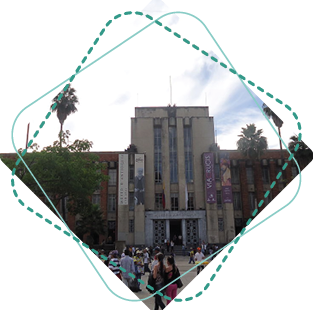EXERCISES
Future Continuous:
Will (not) + be + -ing
The world will be going through many changes in the coming years.
Exercise 1
Talking about the events happening at a given point in the future: The Future Continuous.
1. Watch the video
Now, listen again and read the following examples, paying attention to the words in bold.
• By this time tomorrow, we will be flying over Barranquilla, just before landing.
• What do you think you will be doing at around 5:00 PM tomorrow?
• At 5:00 PM tomorrow, we will be checking in at the hotel.
2. Complete the sentences using the future continuous form of the verbs in parenthesis.
-
This time tomorrow, Clara __________ (travel) to Barranquilla with her husband.
-
At the Frogs Disco, there is a famous chef who __________ (cooking) local food.
-
__________ anyone. __________ (wait) for you at the airport?
-
No, because as soon as we arrive we __________ (rent) a car!
-
We __________ (celebrate) our anniversary with my wife this year.
Exercise 2
Talking about future events: read and listen to the conversations.
1. Select a verb from the box and complete the dialogues using the correct form.

Woman: Where is your brother going to meet us?
Man: He (1) __________ for us when our train arrives in Pamplona. I am sure he (2) __________ on the platform when we get to the station.
Woman: And then what?
Man: We (3) __________ Mary up at work and go out to dinner.
Man: When we get to the party, Penelope (4) __________ TV, Sam (5) __________ drinks, Beth (6) __________ by herself, and Aaron (7) __________ about his day at work.
Woman: Maybe, this time they won’t be doing the same things.
Man: I am absolutely positive they (8) __________ the same things; they always do the same things.
Woman: Oh, look at that mountain of dirty dishes! Who (9) __________ all of those?
Man: I promise I (10) __________ when I get home from work.
Woman: Thanks.
Man: When you get home this evening, that mountain will be gone and nice stacks of sparkling clean dishes (11) __________ in the cabinets.
Exercise 3
Describing future experiences: read and listen to the text.

In the future, we won´t be driving cars. We will be using flying means of transportation. These will fly some meters above the ground and will carry more than four people. They won´t have a pilot because computers will be flying them. They will have a small round table and armchairs inside, like a small living or working room. They will also have TVs and computer screens where people will be able to watch their favorite programs or work while they are flying. They will also have Internet access. These flying means of transportation will not look like our cars today. They won´t have normal doors. The sides of these flying machines will open by moving down slowly under the floor. Another great advantage about these means of transportation is that passengers will never get lost, because the computers flying them will always know where to go.
1. Answer the questions. Write complete sentences.
-
What kind of means of transportation will we be using in the future?
-
How high will these machines fly?
-
How many people will they carry?
-
Why won´t these machines have a pilot?
-
What kind of facilities will these means of transportation have?
-
What kind of chairs will there be inside?
-
What will be a big advantage of these machines?
Exercise 4
Understanding the contect for some actions: read the following passage. Pay attention to the words in bold.

1. Now, match the beginnings with the endings to form complete sentences.

Exercise 5
Recognizing extended phrasal verbs.
1. Find 6 phrasal verbs and write them in the spaces below

Phrasal verbs
1. __________
2. __________
3. __________
4. __________
5. __________
6. __________
Exercise 6
Using definition of extend phrases.
1. Read the following sentences and then select the right meaning for the words in boldface.

• After the avalanche in Armero, the local government is looking after hundreds of kids.
• If you have doubts about the math problem, you can talk to Ramiro. He sails through math!
• When the police arrived, the thieves have destroyed the evidence! They had ripped up all the documents.
• Have you seen Milan, Shakira’s son? He took after his father! They are identical!
• Remember! We are not going to buy anything. We are just going to look around to compare prices.
• I am always stressed because I have to deal with students who failed courses at the university!
Exercise 7
Talking about the past in the future.
Read the examples below. Pay attention to the words in bold.
-
In 10 years’ time, I will have bought a new house.
-
I think astronauts will have landed on Mars by the year 2030.


1. Complete the sentences with the right form of the verbs.

-
By the time the money arrives, we (go) __________ broke.
-
By April, my grandfather (reach)__________ eighty.
-
The president (make)__________ a decision by the end of the week.
-
By 2028, we (know)__________ each other for ten years.
-
In five minutes, Eric (complete)__________ the first lap of the race.
Exercise 8
Practicing the past in the future
1. Are these sentences correct or incorrect?


• Life will be changing a lot by 2040.
• By that time, doctors will probably have discovered cures for many diseases.
• Scientists will have invent devices to make our lives better.
• But there will be some things that won’t have changed.
• We will not have discover a way to communicate with animals.
• By then, there is a chance that we will have invented a new source of water.
• Do you think we will have created a better life
Exercise 9
Talking about the future: the tear 2050.
1. Imagine it is the year 2050. Your city had to be completely evacuated because of a very destructive virus. Listen to the interview. Make sentences in the future perfect using the cues.

-
become / extremely dirty. / the streets of the city / By the year 2050,
-
The city / of gas / run out.
-
their cars / abandon / everywhere. / People
-
Power / go off.
-
the angry population. / Buildings / by / destroy
-
for cancer / discover. / be / A cure
Exercise 10
Understanding time expressions in the future.
1. Read the following examples. Pay attention to words in bold.
-
By the time I’m 50, I will have worked for 28 years.
-
You must complete the application by Friday.
-
We will have to wait until next week and then decide.

-
Use __________ to express when an action will be complete at a specific time in the future.
-
Use __________ to mean “not before” and “not after and not before”.
-
Use __________ to mean “not after” or “not later than”.
Exercise 11
Using time expressions in the future.
1. Choose the right time expression to complete the sentences.
•I’ll keep phoning __________ you pay me.
•I will be gone __________ you arrive.

•It must be finished __________ Thursday afternoon.
•It’s open from 7:00 am __________ 5:00 pm.
•She’ll be staying at the hotel __________ Friday.
•He’ll arrive at five; __________ which time you must not leave the room.
•__________ we get there, it will have stopped raining.
Exercise 12
Talking about the future. Read to the conversation.
1. Complete it with the right word from the box.

Woman: Do you think you’ll still be (1) __________ here ten years from now?
Man: I hope not! I really hope that by that time I will have (2) __________ a better job! I think I’ll have (3) __________ this job by then. Or maybe I´ll be (4) __________ my own company by then. How about you?
Woman: Well, in ten years, I’ll have (5) __________ my student loans at ICETEX. I think I’ll still be here, but with any luck, I’ll have (6) __________ to the Main office in Ibagué.
Man: It’s scary to think of the future, isn’t it? Who knows! Maybe we could both be (7) __________ with lots of kids by then!


Future Perfect Continuous:
Will have (not) been + -ing
You will have been waiting for more than two hours by the time her plane finally arrives.
Exercise 13
Understanding activities in progress in the future.
1. Read the following examples. Pay attention to the words in bold.
-
José Pardo will have been teaching at the university for more than a year by the time he leaves for Europe.
-
How long will you have been studying when you graduate?
Complete the sentences using the correct form of the verb.

-
She will have been (work) __________ here for 3 hours by 9 this morning!
-
Tomás will have been (study) __________ for four hours by the time he takes the test.
-
What will they have been (do) __________ by the time we arrive?
-
Kevin and Anderson won’t have been (play) __________ tennis for long by six o’clock.
-
How long will they have been (wait) __________ by the time he arrives?
Exercise 14
Practicing activities in progress in the future.
1. Complete the sentences using the future perfect continuous.
Watch out for negative sentences and questions.

-
I __________ (work) all weekend so I won’t have a lot of energy on Sunday night.
-
How __________ (you / wait) when you finally get your exam results?
-
Julie __________ (not / eat)much, so we’ll need to make sure she has a good meal when she arrives.
-
How__________ (she / plan) to move house when she finally moves?
-
__________ (she / wait) long by the time we get there?
-
__________ (he / play) computer games for ten hours when he finally stops?
-
They __________ (study) all day, so they'll want to go out in the evening.
Exercise 15
Discovering the future.
1. Complete the phrase

Exercise 16
Differentiating ways to refer to the future.
Read Ricardo’s itinerary for tomorrow.


1. Choose future continuous or future perfect to complete the sentences.

At 8:00 am, Ricardo __________ home.
By 8: 30am, he __________ at the airport.
At 9:00 am, he __________ for his plane.
At 9:30am, he __________ for Puerto Inirida.
At 11:10 am, he __________ in Puerto Inirida.
At 1:30 pm, the meeting __________.
At 7:50pm, he __________ his dinner.
At 10:15pm, he __________ the restaurant.
At midnight, he __________.
At 10:00 am, he __________ to Puerto Inirida.
Exercise 17
Learning to learn.
1. Read the study tip below. Click on the icon to hear it.


Exercise 18
Differentiating between activities in progress in the future and activities that will be completed in the future.
1. Choose future perfect or future perfect continuous to complete the following sentences.

By 2018, we __________ in Medellin for 20 years.
He __________a book by the end of the year.
__________ this novel by next week?



He __________this book for 15 days by the end of this week.
They __________for 40 years by the end of this month.
You __________ pregnant for three months this week.
